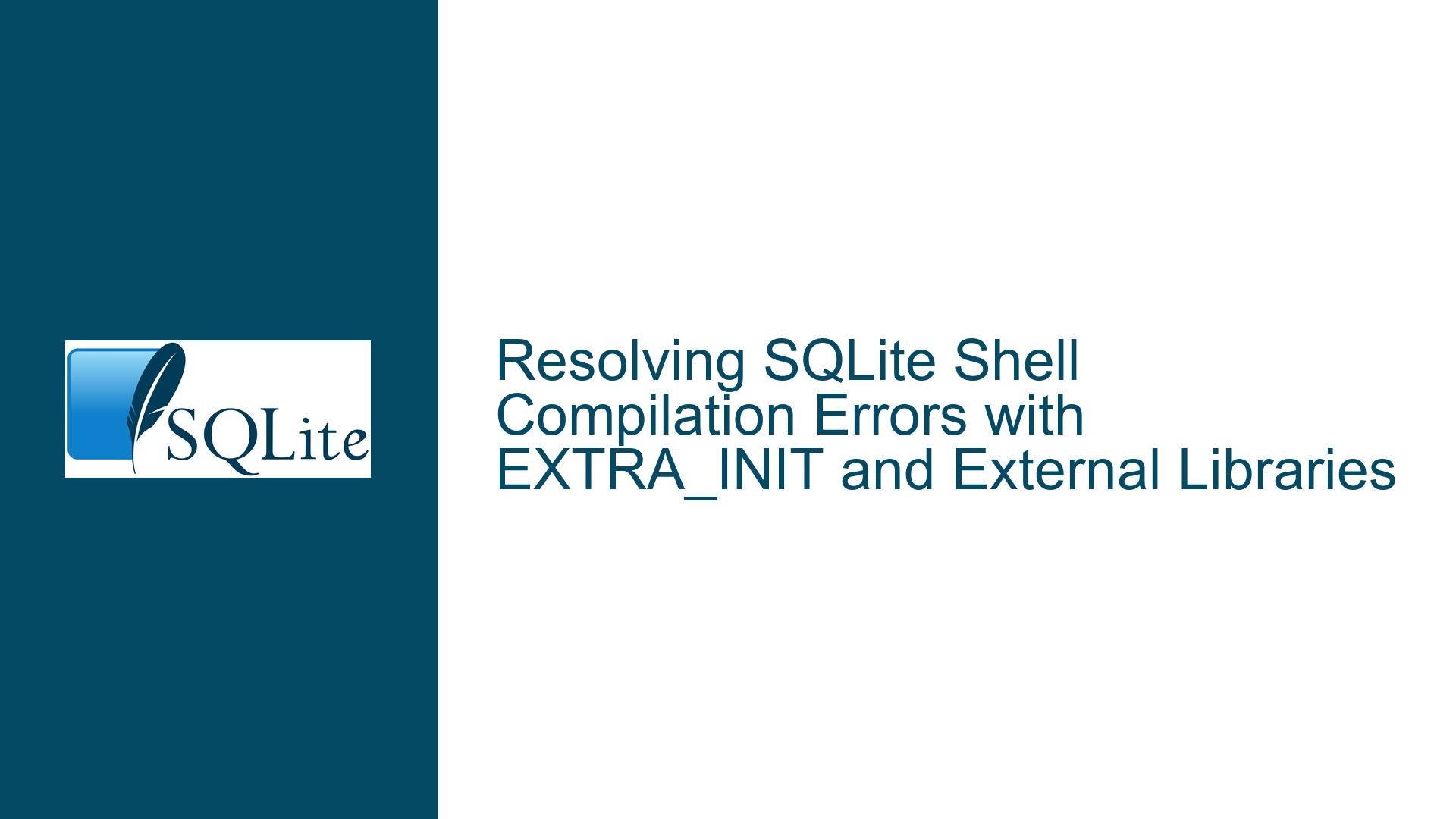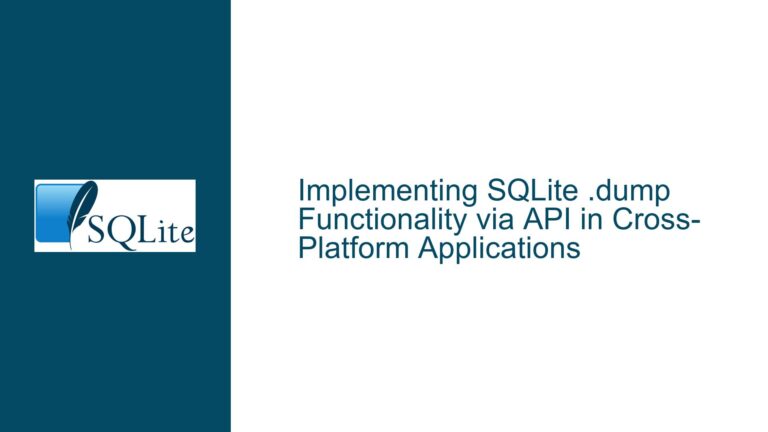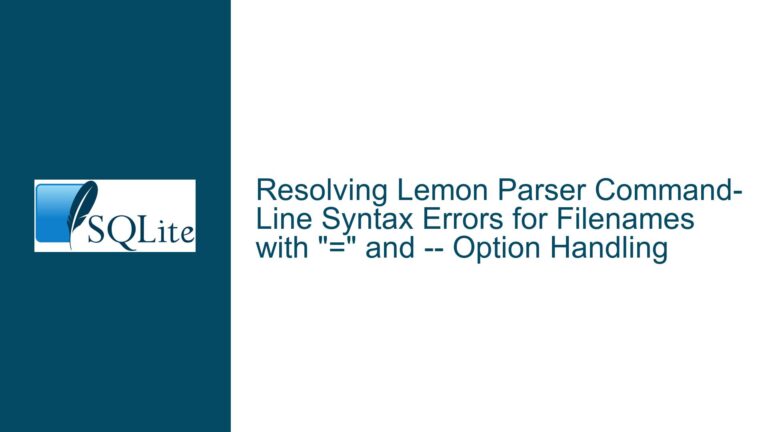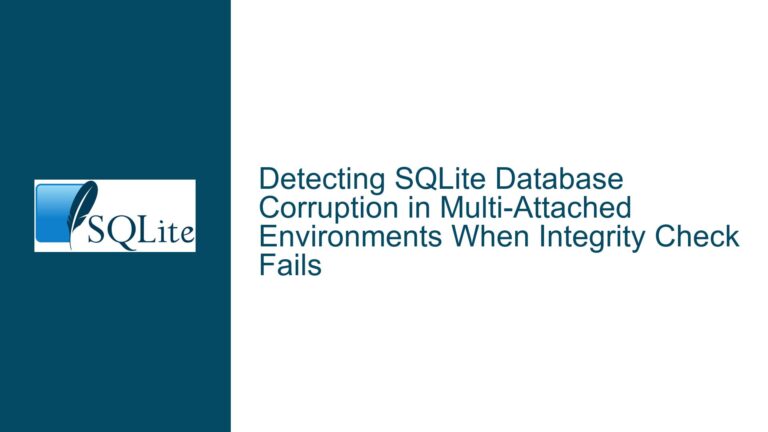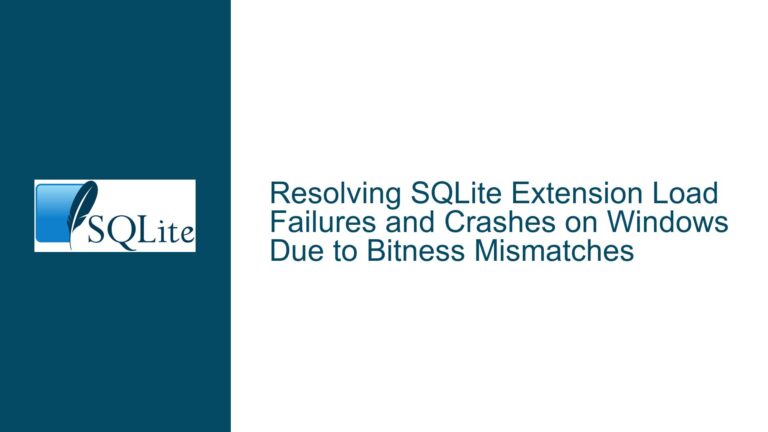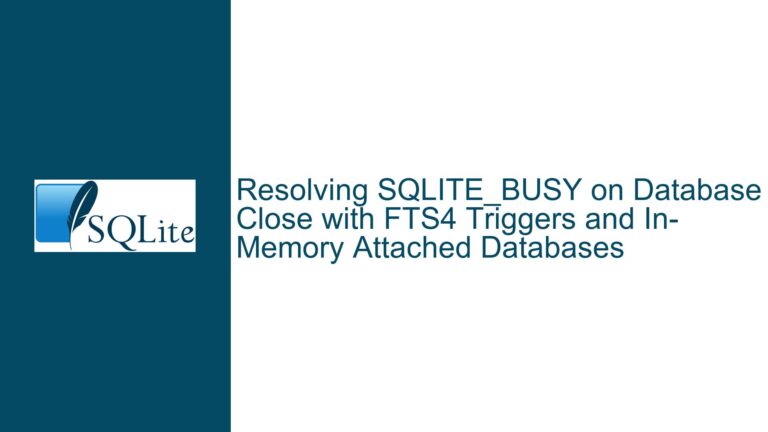Resolving SQLite Shell Compilation Errors with EXTRA_INIT and External Libraries
Issue Overview: Compilation Errors Due to Duplicate Definitions and Missing Library References
When attempting to compile the SQLite shell with custom extensions and the EXTRA_INIT mechanism, users often encounter two primary types of errors: duplicate symbol definitions during linking and undefined references to external library functions. These errors are typically rooted in the interplay between the SQLite source code, the custom extensions being added, and the compilation flags used during the build process.
The first error, involving duplicate definitions, arises when the same function or symbol is defined in multiple object files. This often occurs when a custom extension is included in both the main SQLite source file (sqlite3.c) and the shell source file (shell.c). The linker, tasked with resolving symbols across object files, encounters the same symbol in multiple places and cannot determine which definition to use, leading to a "multiple definition" error.
The second error, involving undefined references, occurs when the linker cannot find the implementation of a function that is declared but not defined within the project. This is common when using external libraries, such as the zlib library for compression functions (compress and uncompress). If the linker is not explicitly told to include the external library, it will fail to resolve these references, resulting in an "undefined reference" error.
Both errors are indicative of misconfigurations in the build process, either in the way source files are included or in the way external libraries are linked. Resolving these issues requires a thorough understanding of the SQLite build system, the role of compilation flags, and the dependencies introduced by custom extensions.
Possible Causes: Misconfigured Build Flags and Missing Library Dependencies
The root causes of these compilation errors can be traced to two main areas: misconfigured build flags and missing library dependencies.
Misconfigured Build Flags: The SQLite build system relies heavily on preprocessor definitions to conditionally include or exclude certain features and extensions. For example, the HAS_SERIES flag determines whether the series extension is included in the build. If this flag is not set consistently across all source files, it can lead to duplicate definitions. In the case of the series extension, the shell.c file includes the sqlite3_series_init function almost unconditionally, while the user’s custom extra_init function in sqlite3.c includes it conditionally based on the HAS_SERIES flag. If HAS_SERIES is not defined, the series.c file is included in sqlite3.c, leading to a duplicate definition of sqlite3_series_init when both shell.c and sqlite3.c are compiled and linked together.
Missing Library Dependencies: Custom extensions often rely on external libraries to provide additional functionality. For example, the compress and uncompress functions used in the compress.c extension are part of the zlib library. If the zlib library is not linked during the build process, the linker will be unable to resolve these functions, resulting in "undefined reference" errors. This issue is particularly common when using extensions that are not part of the core SQLite distribution, as these extensions may have dependencies that are not automatically included in the build process.
In both cases, the errors are not due to flaws in the SQLite source code or the custom extensions themselves but rather to misconfigurations in the build process. Resolving these issues requires careful attention to the compilation flags and library dependencies used during the build.
Troubleshooting Steps, Solutions & Fixes: Ensuring Consistent Build Flags and Correct Library Linking
To resolve the compilation errors, follow these detailed troubleshooting steps:
Step 1: Ensure Consistent Build Flags
The first step is to ensure that all build flags are consistent across the entire project. This includes both the flags used to compile the SQLite source files and those used to compile the shell source file. In the case of the HAS_SERIES flag, it is essential to define this flag consistently to avoid duplicate definitions of the sqlite3_series_init function. If the series extension is not needed, the flag should be defined to exclude it from both sqlite3.c and shell.c. If the extension is needed, the flag should be defined to include it in both files.
For example, when compiling the SQLite shell with the series extension, the following command ensures that the HAS_SERIES flag is defined consistently:
sudo gcc -Os -I. -I /home/tom/sqlite/ext/misc -DSQLITE_EXTRA_INIT=extra_init -DSQLITE_THREADSAFE=0 -DHAS_SERIES -DSQLITE_ENABLE_FTS4 -DSQLITE_ENABLE_FTS5 -DSQLITE_ENABLE_JSON1 -DSQLITE_ENABLE_RTREE -DSQLITE_ENABLE_EXPLAIN_COMMENTS -DHAVE_USLEEP -DHAVE_READLINE /home/tom/sqlite/shell.c sqlite3.c -ldl -lm -lreadline -lncurses -o /bin/sqlite3
By defining -DHAS_SERIES, the series extension is included in both sqlite3.c and shell.c, preventing duplicate definitions.
Step 2: Link External Libraries
The second step is to ensure that all external libraries required by the custom extensions are linked during the build process. In the case of the compress and uncompress functions, the zlib library must be linked. This is done by adding the -lz flag to the compilation command.
For example, the following command includes the zlib library:
sudo gcc -Os -I. -I /home/tom/sqlite/ext/misc -DSQLITE_EXTRA_INIT=extra_init -DSQLITE_THREADSAFE=0 -DHAS_SERIES -DSQLITE_ENABLE_FTS4 -DSQLITE_ENABLE_FTS5 -DSQLITE_ENABLE_JSON1 -DSQLITE_ENABLE_RTREE -DSQLITE_ENABLE_EXPLAIN_COMMENTS -DHAVE_USLEEP -DHAVE_READLINE /home/tom/sqlite/shell.c sqlite3.c -ldl -lm -lreadline -lncurses -lz -o /bin/sqlite3
By adding -lz, the linker is able to resolve the compress and uncompress functions, eliminating the "undefined reference" errors.
Step 3: Verify Extension Initialization
Finally, it is important to verify that the custom extensions are being initialized correctly. The EXTRA_INIT mechanism allows for custom initialization functions to be called when the SQLite library is loaded. In the provided example, the extra_init function registers several extensions using the sqlite3_auto_extension function. It is essential to ensure that this function is correctly defined and that all required extensions are included in the build.
For example, the extra_init function should look like this:
int extra_init(const char* dummy)
{
int nErr = 0;
nErr += sqlite3_auto_extension((void(*)())sqlite3_compress_init);
nErr += sqlite3_auto_extension((void(*)())sqlite3_eval_init);
#ifndef SQLITE_OMIT_VIRTUALTABLE
nErr += sqlite3_auto_extension((void(*)())sqlite3_csv_init);
nErr += sqlite3_auto_extension((void(*)())sqlite3_carray_init);
#ifndef HAS_SERIES
nErr += sqlite3_auto_extension((void(*)())sqlite3_series_init);
#endif
nErr += sqlite3_auto_extension((void(*)())sqlite3_btreeinfo_init);
#endif
return nErr ? SQLITE_ERROR : SQLITE_OK;
}
This function ensures that all custom extensions are registered correctly, provided that the necessary source files are included and the required libraries are linked.
By following these steps, users can resolve the compilation errors and successfully build the SQLite shell with custom extensions and the EXTRA_INIT mechanism. The key is to ensure consistent build flags, link all required external libraries, and verify that the custom extensions are initialized correctly. With these adjustments, the build process should proceed smoothly, resulting in a fully functional SQLite shell with the desired extensions.
